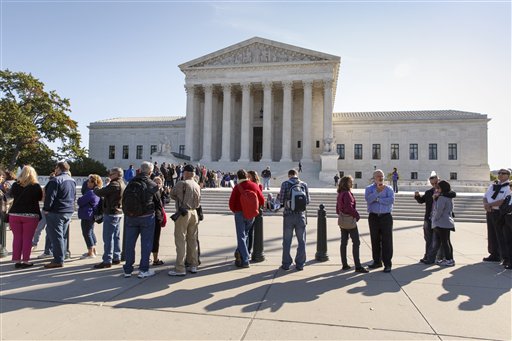 People wait to enter the Supreme Court in Washington, Monday, Oct. 6, 2014, as it begins its new term. The justices cleared the way Monday for an immediate expansion of same-sex marriage by unexpectedly and tersely turning away appeals from five states seeking to prohibit gay and lesbian unions. The court's order effectively makes gay marriage legal now in 30 states. (AP Photo/J. Scott Applewhite)
People wait to enter the Supreme Court in Washington, Monday, Oct. 6, 2014, as it begins its new term. The justices cleared the way Monday for an immediate expansion of same-sex marriage by unexpectedly and tersely turning away appeals from five states seeking to prohibit gay and lesbian unions. The court's order effectively makes gay marriage legal now in 30 states. (AP Photo/J. Scott Applewhite)The 6th Circuit Court of Appeals is expected to rule any day now regarding six cases in Kentucky, Michigan, Ohio and Tennessee dealing with gay marriage. Here's what you need to know:
Q: What are we waiting for? What cases are the 6th Circuit Court of Appeals deciding on now?
A: The 6th Circuit is considering six cases originating in the four states within the Sixth Circuit: Kentucky, Michigan, Ohio and Tennessee. In each case, a federal district judge ruled in favor of allowing gay couples to marry or in favor of recognizing marriages that already existed. Tennessee's three cases involve gay couples who were married out of state and sought the right to have their marriages recognized in Tennessee.
Q: What happens if the 6th Circuit Court of Appeals upheld the lower court's ruling. Can couples get married right away?
A: That depends. If the court issued a stay, or if Tennessee requested one and it was granted, no. They will have to wait for an appeal to be heard, or for the full appellate court or the Supreme Court to say they won't hear an appeal.
Q: What happens if the 6th Circuit Court of Appeals overturns the lower court's ruling. Is that the end of the line for gay couples hoping to get married?
A: Probably not. The couples involved in these cases in each state will likely appeal to the Supreme Court or ask for review by the entire 15-judge 6th Circuit Court of Appeals, called en banc. Either of those courts could overturn the lower court's ruling. Either court can choose to hear those cases or not, and either court could overturn the 6th Circuit's ruling and legalize gay marriage.
Q: Will the Supreme Court take up an appeal?
A: The Supreme Court's "decision not to decide" in early October complicates that question. The Court left decisions about gay marriage in the hands of lower courts, like the 6th Circuit Court of Appeals. It is unlikely that they will take up an appeal if the 6th Circuit upholds the ruling, because that is what other federal courts have decided. Laws would be uniform across the country in places where gay marriage is at issue. However, if the 6th Circuit strikes down the previous rulings, it would create a "split of authority" between federal courts nationwide. In this case, the Supreme Court would likely take up the appeal and weigh in to create uniformity.
Q: Do members of the clergy have to marry gay couples?
A: No. There would be no legal requirement. Previous rulings, like Loving v. Virginia, the 1967 case that made interracial marriage legal, show us that the government has no history of punishing churches that refuse to marry couples.
Stay with the Times Free Press for more information as it becomes available.
